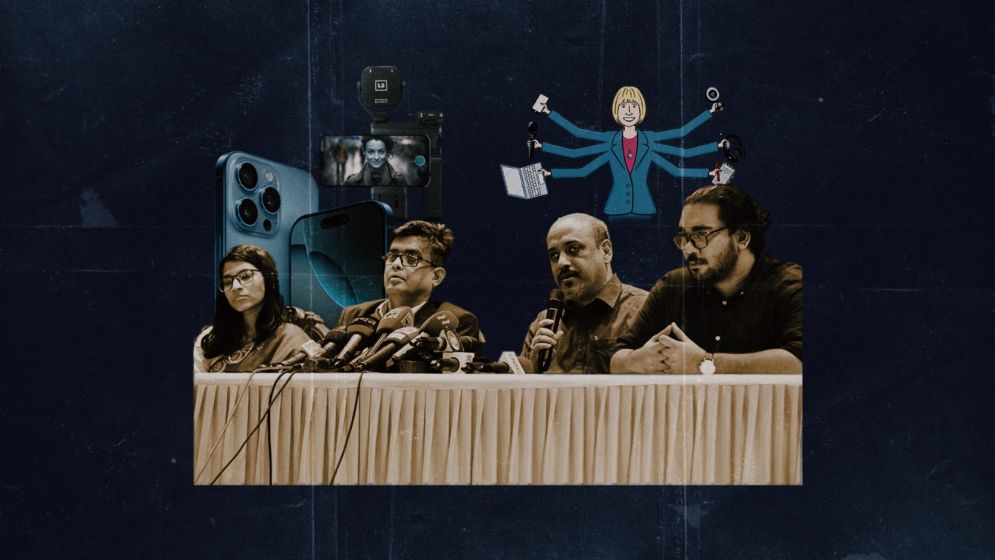CA Press Wing's iPhone plan draws criticism, but context may offer a different perspective

On Monday, a leaked image of a government document set Bangladesh’s social media ablaze.
It showed that six officials in the Press Wing of the Chief Advisor’s Office had been greenlit to receive the latest iphone on the market: the iPhone 16 Pro Max.
Each device costs 257,400 taka—a jaw-dropping sum in a country where the average citizen still struggles with soaring food prices and a fragile economy barely limping out of crisis.
The controversy goes beyond optics. The Bangladeshi government has an explicit cap on equipment purchases like mobile phones: 75,000 taka. That rule was put in place to impose fiscal discipline at a time of economic strain.
But here we are, watching public servants seemingly “flout that ceiling” by more than threefold, and for what? To take better selfies?
For a population still raw from the corruption-soaked years of Sheikh Hasina’s authoritarian rule, this was gasoline on a simmering fire. Social media erupted in fury not just at the indulgence, but at the familiar scent of impunity.
The very people who were supposed to usher in a more transparent, accountable era appear to be slipping into the same habits of excess.
Critics are right to ask: how can a government urging austerity justify splurging on luxury smartphones for bureaucrats? This, after all, is a nation scrambling to stabilize an economy gutted by political mismanagement and nepotistic decay.
Citizens were promised reform. What they see instead is more of the same—just with a newer, glossier finish.
And yet, there are justifiable reasons behind the purchase proposal.
The Chief Advisor’s Press Wing, led by Shafiqul Alam, has been unusually proactive and transparent in documenting the administration’s activities—especially on Facebook, which in Bangladesh is virtually synonymous with the internet.
For the first time in recent memory, the public is receiving real-time updates and detailed accounts of the head of government’s every move.
Now to dismiss the Press Wing’s request for high-end iPhones as sheer extravagance is to miss a more nuanced—and revealing—picture of how modern governance communicates in the digital age.
The Chief Advisor’s Press Wing isn’t merely issuing stale press releases. Its members—deputy press secretaries, senior assistant press secretaries, and assistant press secretaries—function more like full-spectrum multimedia journalists.
They shoot video, snap photos, transcribe briefings, and push content to both journalists and the public within minutes.
They are, in effect, a lean, hyper-responsive media unit embedded inside the government—and they’re operating in real time.

Modern press wing requires modern look
The justification for equipping them with the iPhone 16 Pro Max boils down to two practical arguments: battery life and image quality. These devices aren’t toys—they’re tools. Tools that allow staffers to do the jobs of three people without missing a beat.
The iPhone’s battery can power through a long day of events, and its video capabilities rival those of mid-tier DSLR cameras. That’s not luxury. That’s logistics.
There are also security constraints that complicate media access. Owing to heightened concerns around Chief Advisor Muhammad Yunus’s safety, media coverage of his appearances requires a multi-tiered clearance process, often resulting in journalists being denied access.
In those cases, the burden of documenting and distributing coverage falls squarely on the shoulders of the Press Wing.
During recent international trips—such as to Qatar and the Vatican—official photographers were not permitted at all. Yet, the Bangladeshi public saw near-seamless visual updates throughout, all thanks to the Press Wing’s digital hustle.
Critics argue that the government could simply hire professional photographers instead. But this is where the outrage begins to unravel.
A straightforward cost comparison suggests that equipping a nimble team with iPhones is far less expensive than contracting a full-time media crew.
And unlike external professionals, these press officials already hold security clearance and understand the rhythms of political messaging in high-stakes settings.
In the age of real-time media cycles, it’s not just politicians who must be visible—it’s their stories, their gestures, their travels. And for that, a single versatile device in the right hands does more than a dozen disjointed ones ever could.
Still, this doesn’t excuse the opacity surrounding the purchase. The public deserved to hear this rationale before a leaked image forced it into the spotlight.
Transparency must extend to spending choices—especially in a government that claims to be a break from the murky excesses of the past. It’s not just about what you buy, but how—and why—you justify it.
In the end, this controversy isn’t really about iPhones. It’s about whether the promise of a cleaner, more accountable Bangladesh includes its own inner circle. And that’s a question no gadget—no matter how smart—can answer.
—

